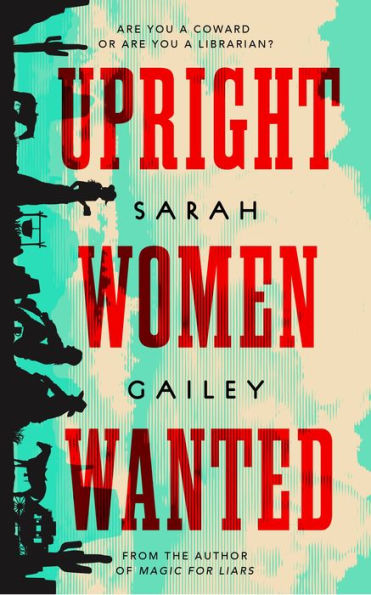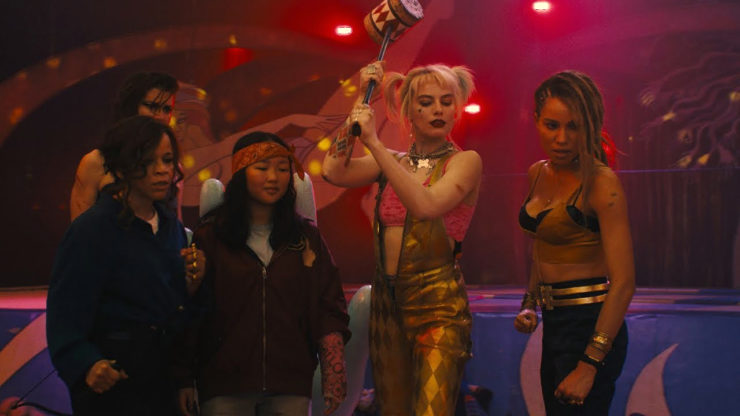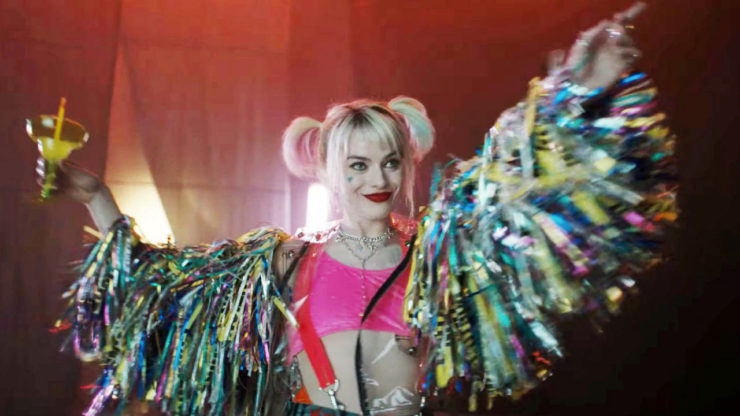I didn’t expect to love Birds of Prey so much, but I’m currently sitting on my bed in a gold lamé jumpsuit, eating a breakfast sandwich and pretending my cat is a hyena, so here we are. On the surface, it’s just a dumb superhero action movie that gave me cause to yell things like “HELL YEAH MURDER SLIDE!” or “KICK HIM IN THE NADS!” at full volume in a movie theater. The film is designed to be pure fun, a carnival of sartorial delights and one-liners tied together by glittery explosions and a soundtrack that can only be described as “bitchin’.” I’m a simple woman, and that would have been enough for me.
But there’s actual substance lurking beneath the surface. This isn’t the first time we’ve gotten a Harley Quinn story, but it’s finally the version of Harley Quinn I’ve always wanted to see—and it’s because she gets to choose who she becomes, and choose the people around her.
My first real introduction to Harley Quinn was seeing a ton of cosplayers waving enormous mallets around at New York Comic Con. I knew she was the Joker’s “crazy” girlfriend, but my knowledge was lacking beyond that; I’d played her as a character in Batman: Arkham Asylum a few times, had seen little snippets of her crooning mischief to “Mista J” in cartoons, but I’d never gotten familiar with her. Harley just hadn’t featured prominently in any of the Batman content I’d consumed until that point. I asked my then-partner what the deal was, and she excitedly gave me the bold strokes of Harley’s backstory: Harleen Quinzel was a teen gymnast who went on to earn a degree in psychology that in turn led her to interning at Arkham Asylum, and falling in love with the Joker. I am convinced my face actually turned into the heart eyes emoji when I heard that. I already loved seeing the cosplayers fully give in to gleeful chaotic energy in their little harlequin getups, and the idea of this kitschy cartoon character having some actual intellectual heft made my nerdy little heart expand ten sizes. A nuanced character, coded as being mentally ill, but also hyper-competent enough to give both The Joker and The Batman a run for their collective monies? Sign me all the way up.
Buy the Book


Upright Women Wanted
I borrowed my partner’s copy of Paul Dini and Bruce Timm’s The Batman Adventures: Mad Love, excited to dive into Harley’s origin story. Reader, I fucking hated it. It was a betrayal of everything I wanted for HQ. It implied that Harley was just a hot prep school babe from a snobby, cold family. She’s got the flexibility of a gymnast, earned her psychology degree on her back and traded on connections to get a prestigious internship at Arkham. Once there, ditzy little Harleen was dumb and weak enough to fall for the Clown Prince of Crime; he worms his way into her head and uses her to escape the asylum, and then to complete whatever weird anti-Batman plot he’s got going. Harley Quinn isn’t even a sidekick; she’s a means to an end dressed up in skimpy spandex, and her only goal is to make the Joker fall in love with her. It’s the opposite of fridging; she isn’t murdered to give someone who loved her a purpose—her whole character is built around the sole purpose of making someone love her.
I was furious. I wanted a Harley Quinn story where Harley’s psychology degree is in full effect; she’s in the Joker’s head as much as he’s in hers, and she’s able to pull one over on him just as often as he does to her. In Mad Love, we see hints of Harley’s brilliance: she hatches a plan to capture and kill Batman by feeding him to a school of piranhas in order to make The Joker love her. Yes, it’s cartoonish and wildly improbable—but it also works, which is more than The Joker can say for himself at this point in the story. Batman is trussed up like a Christmas ham at Harley’s mercy, and the only reason Brucey boy is able to get free is that he preys on Harley’s doubts about her Puddin’, and convinces her to lie to the Joker and tell her she’s killed him, just to see how he’ll react (for those wondering, the answer is “not well;” The Joker throws Harley out an actual window).
Sure, Harley Quinn isn’t fully stable, but who among us is? After reading Mad Love, I shied away from Harley Quinn stories, because they just disappointed me.
I was craving a woman who didn’t exist—until, against all my expectations, Birds of Prey. At the beginning of the movie, Margot Robbie drunkenly delivers a powerhouse line that encapsulates her whole journey: “Do you know what a harlequin is? A harlequin’s role is to serve. It’s nothing without a master.” That’s the whole core of Birds of Prey; it’s about Harley Quinn finding out who she is without a master.
There is so much power in that movie: the outfits, the plethora of hotties that are not objectified, the fight scenes that could go toe-to-toe with anything out of the MCU big leagues, the bonkers one-liners. The first few minutes of the film, it’s Harley going through a break up with the Joker, and boy howdy, she is not taking it well—but it’s not because he broke her heart; that’s a part of life, and she gets that. What’s so depressing to Harley is that no one thinks she’s worth anything by herself, or she can stand on her own without the Joker—and worse, she’s not sure if they’re wrong. It’s a breakup movie that doesn’t automatically say “Don’t worry, Harley got herself a new man” (unless you count the sandwich). The film is bookended by Harley trying to woo her new roller derby friends with a platter of margaritas, and overhearing them badmouthing her—and then, at the end, offering her new friends a tray of “Morning Margaritas” (iconic), and overhearing them complimenting each other. She’s breaking up with her past, and instead of getting a new man, she got herself a new crew, who support each other—not a new master. Harley Quinn is literally trying to redefine the meaning of her name, and by extension, her whole sense of self.
Harley Quinn has a powerful story because she’s unable to fit in to the world she’s born in, so she goes and finds a new crowd to run with—but in choosing the Joker and his gang, she chooses wrong. Birds of Prey is not just a found family narrative; it’s a second chance at found family, one that acknowledges personal growth and self discovery—that maybe, this harlequin in particular, doesn’t need a master in order to be someone, and also the sometimes enormous need we all feel to explode a chemical power plant. A harlequin’s role may be to serve, but who she serves, and how she fulfills the terms of that service are of critical importance. Harlequins don’t just exist to serve a master; they function as part of a court. In Birds of Prey, Harley trades in her old master for a new court of misfits, all of them unwillingly bound in service to the new would-be master of Gotham City, Roman Sionis. And they want nothing to do with him. So what is a harlequin without her master? The answer is: whatever she wants, so long as she’s got a full court backing her up. No gods, no masters, only mayhem!

Lately, the biggest properties in nerddom have all been found family narratives; The Mandalorian adopts Baby Yoda and woe to anybody who tries to hurt his smol green son; Geralt of Rivia accidentally wins a baby in a bet and now he’s a father, dammit; Rey spends a lot of time with sexy space bisexuals and decides to reject her biological father; and of course, let us not forget the Fast and Furious saga, which taught us that not all blood is family (and also that Coronas and cars are family too).
It’s a powerful trope; it represents the ability to forge deep bonds and connections with people of your own choosing. For nerds, specifically, it also harkens back to the moment when you finally find “your people.” Sure, being a nerd is “cool” now, but it wasn’t always—and there’s no feeling quite like discovering that there are SO MANY OTHERS who go hard on that one niche subject that you thought only you liked! And let’s not pretend that finding a new group of besties who teach you how to fight super well isn’t also wish fulfillment on some level; many of us were bullied, and while violence doesn’t solve all problems, I think having an enormous mallet (and the ability to use it) would have made my junior high school years much more palatable. So it’s no wonder to me that every new sci-fi/fantasy/comic book film or television show seems to have done a deep dive on the “found family” tag in AO3.
Suicide Squad is also a found family narrative, in its own way—but for Harley, it’s like going from the frying pan into the Jared Leto-looking fire. Birds of Prey gives Harley a second chance at finding herself. Being mentally ill means that you wear different versions of yourself every day, and sometimes, the clothes don’t fit. By that logic, Harley’s arc in Birds of Prey is the equivalent of realizing you’ve spent several years building up a wardrobe that you hate, ceremonially burning it in the moonlight, and then going on a shopping spree for the new look you so desperately need. Ever put on a pair of jeans that just fits, after trying to squeeze yourself into something that didn’t? It’s freeing. I don’t know that I’ve ever seen a second chance at a found family story, but now I want more.
Harley’s girl squad is full of extraordinary badasses who maybe don’t all have the most neurotypical brains, but who accept that about each other nonetheless. One of the most wholesome moments in the whole movie comes when Huntress endearingly and awkwardly tries to compliment Black Canary on how high she’s able to kick in her very tight pants; they build each other up for their skills, instead of trying to take each other down. They accept each other for the roving trashbags that they are, and as a self-identified trashbag, I find that inspiring.
There’s a flashback scene where Harley remembers how the Joker made her jump into a vat of chemicals to prove her devotion (kids: jumping into a vat of chemicals is not a good way to prove love—Chuck Tingle wouldn’t want you to do that!). This dumb man literally made a genius babe take a bath in some toxic shit to show she was “down to clown,” as it were. Meanwhile, there is no need for proof between the Birds of Prey; they’re not always great to each other, but they’ll always hand a bitch a scrunchie during a fight, or call each other on their shit over a round of morning margaritas.
Harley hasn’t always gotten the story she deserved, and maybe she made the mistake of choosing a master instead of a family the first time around, but that’s what second chances are for.
Caroline Perny is a lover of glitter, chaos, and breakfast sandwiches. She is a publicity manager at Tor Books by day, and a nerdy metalhead by moonlight. Pronouns are she/her. Follow her on Twitter @CarolinePerny.










